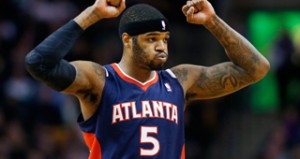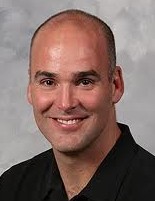 ATLANTA – If Atlanta’s Game 6 elimination loss to Indiana was Josh Smith’s final game as a Hawk, the star’s final performance was a near-perfect microcosm of his nine-year tenure in Atlanta.
ATLANTA – If Atlanta’s Game 6 elimination loss to Indiana was Josh Smith’s final game as a Hawk, the star’s final performance was a near-perfect microcosm of his nine-year tenure in Atlanta.
Friday night was fittingly consumed with frustration and bad decision-making, plenty of impressive defensive stops, and conclusively mixed results.
The Hawks lived and died with Smith as their star all season and eventually paid for all of his shortcomings on Friday.
To see where the Hawks went wrong in Game 6, one only has to look as far as the first quarter play-by-play recap to understand:
11:40 – Josh Smith misses 22-foot jumper
11:03 – Josh Smith misses hook shot
8:17 – Josh Smith misses 22-foot jumper
3:31 – Josh Smith misses 19-foot jumper
1:31 – Josh Smith misses 26-foot 3-point jumper
Initially, the fans were quietly optimistic about Smith as he squared himself for his first shot on the game’s first play. However, as miss after miss clanked off of the rim, any room for hope was quickly replaced with absolute disgust.
“They’re letting you shoot that damn ball for a reason. It’s not going to go in,” shouted one critic sitting several rows behind me. Another fan chimed in, “You’ve got to be freaking kidding me. Stop shooting the ball!”
Regardless of the crowd’s groans, Smith simply would not stop hoisting the ball up. As he continued to camp out on the perimeter and take shots, his teammates grew visibly uncomfortable on the court and Larry Drew’s game plan grew harder and harder to keep up with.
“I think, when looking at the game as a whole, we didn’t do a good job with our shot selection. I thought we settled a lot,” said Drew. “That was one of the points of emphasis in the series. We knew going into every game against this team that we couldn’t settle for jump shots.”
Smith finished 5-for-16, including 0-for-4 on 3s, for 14 points with four turnovers.
Now, he becomes an unrestricted free agent and wants a max contract despite never making an All Star team.
Good luck with that, Josh. Don’t expect Atlanta to give you that kind of paper.
 Properly determining Smith’s value will be an extremely important priority for general manager Danny Ferry this summer.
Properly determining Smith’s value will be an extremely important priority for general manager Danny Ferry this summer.
Drafted out of high school in 2004, Smith joined the NBA as a very raw athlete with prodigious defensive instincts and limited offensive abilities. He won the dunk contest as a 19-year-old and made fans hopeful that he was the second coming of Dominique Wilkins. The Hawks figured Smith would eventually find his jump shot and become one of the most versatile scorers in the league. Nine years later, however, Smith is pretty much the same poor jump shooter he once was. Smith and his supporters cannot reasonably expect him to ever become a legitimate perimeter threat.
Regardless of his shortcomings as a shooter, Smith’s contributions elsewhere on the court are undeniable. He is still one of the league’s most dynamic big men with supreme passing abilities and unusual athleticism for a guy of his build.
Drew certainly believes Smith’s positives outweigh his negatives, “People like to talk about his shot selection, but he brings a lot of other things to the table. His defensive effort against an All Star in Paul George was absolutely phenomenal. Although he gave up speed and quickness, he battled him well throughout the series. Josh is a very versatile guy. We can’t only look at what we perceive to be his faults. We must remember all of the other intangibles that he brings to the table. One of the biggest reasons that we were going into a Game 6 against one of the best teams in the league was because we had Josh Smith to begin with.”
Prior to the game, I held some optimism that the Hawks would be able to agree to a contract extension with Smith this summer. After all, Smith and Al Horford complement each other well and seem to get along on and off the court. Moreover, Smith’s hometown allegiance, however limited it is at this point, has to count at least for something.
However, after watching tonight, nine years of frustrating shots and careless turnovers by Smith have manifested themselves into vociferous boos every time Smith considers shooting the ball from the perimeter. Smith cannot play freely with his home crowed heckling him. At Smith’s lowest point on Friday night, after he committed three turnovers in a span of under four minutes in the second quarter, the crowd began their harshest attack of Smith yet. Fragmented chants of “Josh Smith sucks” spurted throughout the Highlight Factory.
The only player in any sport that I had ever seen receive as much scorn from his own fans in the middle of a competitive playoff game was Alex Rodriguez. In Rodriguez’s case at least, the booing was justified as baseball is a far more of an individual’s sport, and Rodriguez’s unparalleled contract and consistent knack for untimely strikeouts make him a prime scapegoat for the Yankees’ struggles.
With Smith, the story’s different. Smith is paid handsomely but not egregiously. His Game 6 offensive struggles were obvious but he had also pieced together some spectacular offensive performances earlier in the series and had been doing a great job of containing Indiana’s biggest offensive threat in Paul George all night. (George finished with 4 points.) 
The lack of understanding from some Hawks fans of how to take the good with the bad from Smith makes his departure in free agency both inevitable and necessary. Smith has nothing left he can do for Atlanta. His 52 career playoff games played ranks him right up there with the greats from Hawks history.
When he came to the NBA as an 18-year-old, he joined a struggling Hawks team. By the end of this season, however, Smith had been a primary reason for the Hawks’ six-year playoff failure streak.
Although he might not deserve a maximum contract, he still deserves significant compensation this summer. Because of this, it is more likely than not that a team would completely overspend to get him. For Atlanta, overspending to merely retain a player will never again be an attractive option.
Hawks fans saw what happened when they reluctantly overpaid to keep their last star who was bound to leave in free agency.
With Joe Johnson in the summer of 2010, the Hawks gave Johnson the maximum simply because they didn’t want to lose him for nothing. By the summer of 2012, however, Johnson was already the scapegoat for the Hawks’ postseason ceiling and was considered nearly untradeable by most executives around the league due to the size of his contract.
If Smith is already the scapegoat in Atlanta for his shooting woes, imagine how much hate he would receive if he signed a contract similar to the one Johnson signed in 2010. After all, in Atlanta especially, the Johnson fiasco was way too recent in the organization’s memory for them to make that mistake again.
Fans will undoubtedly feel lowballed when they lose Smith without receiving any compensation. The reality, however, is that losing Smith for nothing is not the end of the world for the Hawks. Danny Ferry is smart enough as an executive to know that when he decided not to trade Smith for change on the dollar at the deadline in February, he was making the calculated assessment that half a season of Smith was more valuable to the Hawks than multiple seasons with role players like Epke Udoh and Luc Richard Mbah Moute.
As for Smith himself, he will not go into details about his impending free agency, “I don’t like to look too far into the future,” said Smith. “I like to look at the present and focus on that. I’ll have time to sit down in the next few weeks and reflect on some decisions that will need to be made. The only thing I know is I want to be able to experience free agency. I want to explore my options and see what’s out there. I don’t have any certain idea what’s going to happen.”
Smith already announced in February that he sees himself as worthy of a maximum contract. In honesty, Smith may be able to find two or three teams out there who are desperate enough to give him that (or close to that) type of money.
Fellow impending elite free agent David West thinks Smith is young enough and has a large enough body of work to garner serious interest this summer, “Obviously Josh is at a different point in his career than I am so he can kind of set the bar however high he wants to set the bar for himself. It will come down to if teams want to pay him that. All in all, he’s a hell of a player.” 
For Smith, the fairytale of being his city’s hometown hero may be coming to a disappointing end. Smith has come to terms with the bittersweet resolution that he may have played his final game as a Hawk, “If this is it for my time in Atlanta, I’ll say something when I have to.”
If this is it for Smith in Atlanta, at least his final quarter showed his truly enigmatic nature. In the closing minutes, Smith made several highly contested shots to bring what was once a 19-point deficit down to four. Meanwhile, he also ignored a play Larry Drew had called for and subsequently shot a desperation 3-pointer on a crucial possession that West managed to block.
The last shot of Hawks’ season would be a poetic ending to the Josh Smith era in Atlanta. With six seconds left in the game and the game out of reach, Smith took his last uncontested jump shot. The crowd let out a final moan and watched Smith’s shot clank well to the left of the rim.
“My thoughts [in the closing seconds] were what I could’ve done better to extend the season. It’s really nothing as far as thinking into the near future about where I’m going. As I walked off the court, everything just sort of hit me,” Smith told the media. “Just the uncertainty of what the future holds. Just thinking about all of the relationships I’ve had here and the people who’ve crossed my path since I’ve been here. I just … I just don’t know.”
Only time will tell what happens to Atlanta and Smith this summer. If the Hawks follow history, they will be right to let their hometown hero walk.
Jacob Eisenberg is a sophomore at Emory University in Atlanta. Check out his Web site, jacobeisenberg.com. Follow him on twitter @eisenberg43